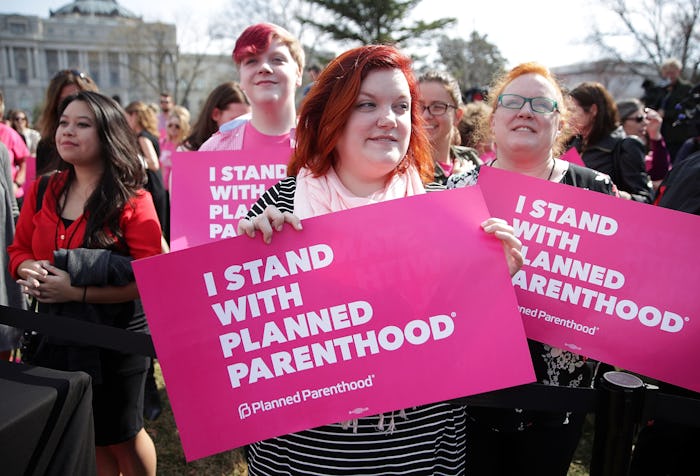Life

How Defunding Planned Parenthood Affects Maternal Deaths
On Wednesday, people all over the country wore pink, changed their profile picture to pink, and spoke out in support of Planned Parenthood for Pink Out Day. It was a gesture meant to offer solidarity to Planned Parenthood clinics across the country and the women who seek them out for their reproductive health care services. A gesture to hopefully ward off the Trump administration's threat to cut off funding to Planned Parenthood. While President Trump's proposed health care overhaul has been stalled, the fight is not over. There is still the possibility that Planned Parenthood could be defunded, which could have a disastrous effect on maternal mortality rates if history repeats itself.
Congressional Republicans have long been fighting to cut off federal funds to support Planned Parenthood; funds that are not used for abortions, but rather for other health services like breast and cervical cancer screening. When the Trump administration attempted to repeal Obamacare and replace it with a new healthcare plan, conservative Republicans refused to vote on any legislation that allowed for federal funds to go to Planned Parenthood. The healthcare plan was scrapped by President Trump on Friday, in part because the two parties could not agree on Planned Parenthood funding.
While politicians continue to debate the ramifications of defunding Planned Parenthood, one issue remains uncertain; how would it affect maternal mortality rates? Well, if the state of Texas tells us anything, the news is dismal.
After funding to the reproductive health care clinics in Texas was pulled by the Republican legislature in 2011, maternal mortality rates began to increase. Before state legislation was passed that slashed a whopping $73.6 million from Texas' family planning budget of just over $11 million, the maternal mortality rate was relatively low. This massive cut forced 80 clinics across the state to close, and with those closures the maternal mortality rates began to rise dramatically, according to The Guardian. In fact, the mortality rate actually doubled; from 2000 to 2010, the maternal mortality rate in Texas was between 17.7 and 18.1 per 100,000 births. By 2014, the maternal mortality rate was 35.8 per 100,000 births. The highest maternal mortality rate in the developed world when there is no war, famine, or natural disaster.
Considering the fact that maternal mortality rates were down in California — the only other state with a large enough population to get a true sense of the bigger picture — according to CNN, and that no other state saw such a massive increase, this news does not bode well for women's reproductive health in the U.S. if Planned Parenthood is defunded on a national level.
Planned Parenthood clinics need federal funds in order to continue to serve the 2.5 million women they serve every year. Period. Women need access to health care. It's 2017 and is really ridiculous that either of these issues are still being questioned.